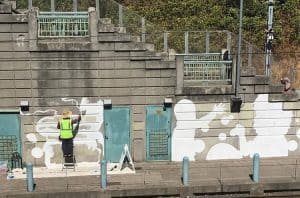RACC search committee members Linda McGeady, Steve Rosenbaum and Ozzie Gonzalez, and interim executive director Jeff Hawthorne, recently accepted invitations to meet with constituents interested in the status of RACC’s search process, including 20 leaders of local arts organizations and 5 representatives from AWE – Arts Workers for Equity.
RACC representatives heard questions in these meetings about the board-only composition of RACC’s search committee; encouragement to do a better job of communicating what is going on and why; and concerns about leadership in the arts in this challenging and exciting environment. We also heard words of encouragement and support, and we are very grateful for those.
Informed by these and other discussions over the past month, the search committee recommended adding two staff members as voting members, and Jeff Hawthorne as an ex officio, non-voting member. Staff chose Helen Daltoso and Salvador Mayoral as their representatives, and the committee nominated Linda McGeady and Angela Hult as committee co-chairs for the new fiscal year. The board enthusiastically approved all of these changes on June 28, so the new composition of the search committee is:
- Linda McGeady (board), co-chair
- Angela Hult (board), co-chair
- Helen Daltoso (staff)
- Ozzie Gonzalez (board)
- Jeff Hawthorne, ex officio
- Salvador Mayoral IV (staff)
- Alejandro Queral (board)
- Steve Rosenbaum (board)
The search committee will continue to assess its composition and evaluate its processes on an ongoing basis. We remain committed to including more than 20 additional community members in the final vetting of candidates, and will continue to do everything possible to eliminate unconscious bias from decisions that are made.
The search committee also wants to clarify that extending the search does not add significant expenses to the budget. $67,000 has been budgeted to date, including the costs associated with our executive search firm, Koya Leadership Partners. Koya is still under contract to deliver a candidate at no additional expense, but RACC may incur some additional, relatively nominal expenses in bringing out-of-town finalists to Portland.
The search committee will continue to post updates on racc.org, and the job description is posted here (HTML) and here (PDF). Candidates should apply directly to Koya, but you can also contact the search committee by emailing EDSearch@racc.org.




